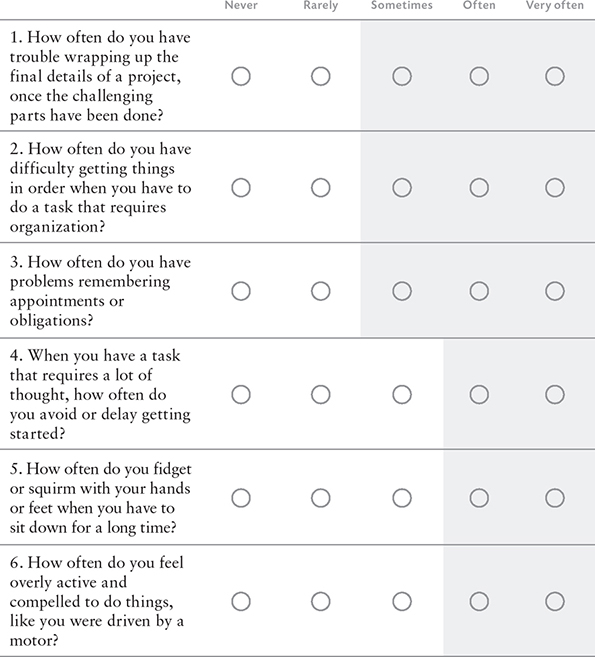Lose the Clutter, Lose the Weight (15 page)
Read Lose the Clutter, Lose the Weight Online
Authors: Peter Walsh

The following tool, called the ASRS, can quickly shed light on whether ADHD or its symptoms are likely to be a problem for you. This questionnaire was developed by the World Health Organization, with the help of experts on adult ADHD.
The symptoms in this surveyâespecially the first fourâare likely to impact how well you can create and stick with a plan to address your weight and your household clutter. These issues are all fairly common in today's society, and you certainly don't have to have ADHD for them to affect you.
ADULT ADHD SELF-REPORT SCALEâV1.1 (ASRS-V1.1) SYMPTOM CHECKLIST
Check the circle that best describes how you have felt and conducted yourself over the past 6 months.

Scoring:
Place a check mark in the appropriate circle for each answer. Add the number of check marks that appear in the shaded area. Having 4 or more check marks in the shaded area suggests that your symptoms might point to adult ADHD. You may want to ask your health care provider if you should be evaluated for the condition.
© World Health Organization, 2003.
MEASURING YOUR EMOTIONAL EATING
Finally, I'd like you to test one more area in which your emotions influence your health.
Whenever you're making decisions, the emotions you feel during those moments affect the choice you wind up making. This is true for decisions about buying or picking up free items (Do I take this home or not?) and how you're going to eat (salmon steak or regular steak?).
In the last chapter, we learned that anxiety, depression, and lack of attention can make you more likely to grow overweight. In part, that's because it's common for people to reach for food when they're feeling an unpleasant emotion, says Edie Goldbacher, PhD, an assistant professor at La Salle University in Philadelphia. She's a psychologist with an interest in emotional eating, and she often works with people who have both weight and mood issues. Emotions that can trigger a desire for food include:
 Stress
Stress
 Sadness
Sadness
 Guilt
Guilt
 Shame
Shame
 Boredom
Boredom
You may also reach for food when you're sleepy or fatigued, which are more physical sensations than emotions.
Positive
emotions can certainly trigger emotional eating, too, such as when you're celebrating at a party or you're ushering in the weekend with a Friday dinner with friends.
According to author Jenny Taitz, PsyD, author of
End Emotional Eating,
when you're eating for emotional reasons, you don't necessarily realize it. But the following situations generally have an emotion lurking in them:
 Snacking when you aren't even hungry
Snacking when you aren't even hungry
 Feeling a sense of emotional relief while you're eating
Feeling a sense of emotional relief while you're eating
 Feeling a powerful urge for a particular food
Feeling a powerful urge for a particular food
 Eating during or just after a stressful event
Eating during or just after a stressful event
 Using food to make your emotions feel less powerful
Using food to make your emotions feel less powerful
If you have a tendency to eat in response to emotional triggers, you may have been developing this behavior since childhood, Dr. Goldbacher says. Perhaps you learned it from your family, your culture, or your own choices (you felt bad one day, ate a brownie and felt better, and stuck with this routine).
Now when an event occurs that makes you feel worried, or sad, or boredâor you even
think
about these emotionsâyou reach for the food that you know will help you feel better. Some people are so scared of feeling strong emotions that they're especially likely to use food to quell these feelings or provide a distraction, according to Dr. Taitz.